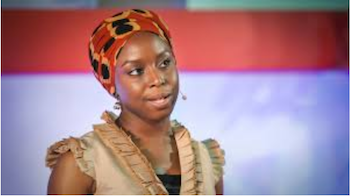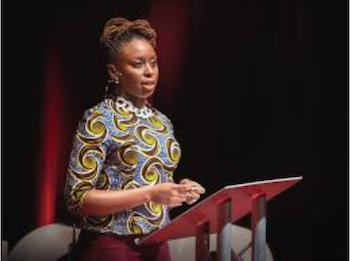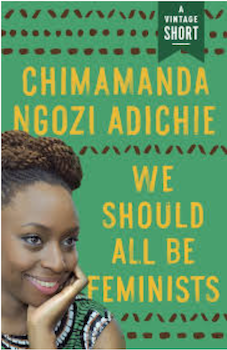
Born in Enugu, Nigeria on September 15, 1977, Chimamanda Ngozi Adichie grew up on a University Campus in Eastern Nigeria with her father who was a professor, and her mother who was an administrator. She began reading at a very early age of four, where she immersed herself in American and British children’s books. Adichie began writing at the age of seven, her stories reflecting the white culture manifested within the children’s books she was exposed to. Upon discovering traditional African children’s books, although more difficult to find, her perception of literature changed, sparking an exigence for her activism.
At the age of 19, Adichie left Nigeria for the first time to attend Eastern Connecticut State University in the United States. Once in America, she recalls experiences of people thinking she was incapable, even of little things such as using a stove. In addition, they assumed she couldn’t speak English well despite English being Nigeria's first language. She even recalls people feeling sorry for her even before meeting her. Overall, she was surrounded by people who held stereotypes of her all because of her skin color and home country, rather than seeing what she was capable of. Through great determination, Adichie graduated summa cum laude with a bachelor’s degree in political science and communications. From then on, she earned two more master’s degrees, including a master’s degree in creative writing from Johns Hopkins University and a master of arts degree in African history from Yale University. She also accumulated a plethora of honorary doctorate degrees from top universities across America: Eastern Connecticut State University, Johns Hopkins University, Haverford College, Williams College, the University of Edinburgh, Duke University, Amherst College, Bowdoin College, SOAS University of London, American University, Georgetown University, Yale University, Rhode Island School of Design, Northwestern University, University of Pennsylvania, Skidmore College and University of Johannesburg. Adichie was also offered many fellowships from Harvard University, Princeton University, and the MacArthur Foundation Fellowship.

In 2003, Adichie’s literary career first launched when she published her first novel called “Purple Hibiscus”. This coming-of-age book follows the life of a young Nigerian girl while she faced oppression and abuse from her religious father. This story helped to encapsulate the relationship between family and freedom. Accordingly, her work earned the Commonwealth Writers’ Prize: awarded annually for the best piece of unpublished short fiction. A few years later in 2006, Adichie released the novel “Half of a Yellow Sun” which was inspired by the experiences of her parents during the Nigeria-Biafra war. Her four years of research and writing for this novel paid off as it became an international best seller and was awarded the Orange Broadband Prize for Fiction in 2007. From then on, she continued to publish popular works such as “The Thing Around Your Neck” in 2009 and “Americanah” in 2013. All of these pieces helped to share the unique stories of African and Nigerian women, along with their capabilities and bravery, so that they did not seem so foreign and incapable to outsiders.
Even with her popular literature pieces, Adichie is most commonly known for her two TED talks: “The Danger of a Single Story” (2009) and “We Should All Be Feminists” (2012). Her first TED talk given, “The Danger of a Single Story,” follows her upbringing and how she was able to develop her own authentic culture surrounded by people who were so uneducated by foreigners. Exposed to stories only about other white children until she discovered African books, she never realized people like her could be a part of the story too. When she came to the United States, people were fed these same stories, never exposed to African books or diversity, and were unable to picture her capable of living in a modern world. In this speech, she warns that if we are only exposed to one kind of story in life, we will truly be misinformed and uneducated. Today, this is one of the most viewed TED talks of all time, with over 37 million views on the TED Talk website and over 13 million on YouTube, helping to emphasize the importance of diversity and inclusivity.
Her other TED talk, “We Should All Be Feminists” is one of the most popular women’s empowerment speeches and described the definition and importance of feminism in the 21st century. She developed this speech into a book in 2014. The speech was so popular that parts of her speech were featured in the song “Flawless” by the well known African-American singer-songwriter Beyonce in 2013.

Over time, Adichie continued to write literary pieces such as Dear Ijeawele, or A Feminist Manifesto in Fifteen Suggestions which was published in 2017. After her fathers death, she published “Notes on Grief'' in 2021, and soon after, she created her first children’s book called “Mama’s Sleep Scarf” in 2023. Adichie has not stopped to devote her time to writing. When she gets the chance, Adichie divides her time between the United States and Nigeria, where she leads an annual creative writing workshop between the two countries. When she isn’t working, she spends her time with her daughter and Nigerian-American husband Ivara Esege in the suburbs of Baltimore, Maryland.
To this day, Adichie’s work continues to inspire millions of women, Africans, and humanity itself. Her work has been translated in over 30 languages, and in 2015, Time Magazine named her one of the 100 Most Influential People in the World. Two years later, Fortune Magazine named her one of the World’s 50 Greatest Leaders. She’s received numerous awards such as the W. E. B. Du Bois Medal in 2022. The W. E. B. Du Bois medal is Harvard's highest honor in the field of African and African American studies. It is awarded to individuals across the globe in recognition of their contributions to African and African American culture and lives. Even with her busy writing schedule, Adicihie still finds time to give dozens of influential speeches, including commencement speeches at top colleges like Yale and Harvard, panel talks, and many others. Adichie made history with her powerful words and helped to empower women and Africans across the world, whilst also raising awareness for the importance of diversity, equity, destigmatization, and strength.
Why Did I Choose to Research Chimamanda Ngozi Adichie?
I chose to research Adichie because she was the first women’s rights advocate that truly inspired me. When I was in 8th grade, I was assigned to do a report on any TED talk of my choosing. After coming across her “We Should All Be Feminists” TED talk, I decided to do my project about her, and ever since then, I have devoted most of my free time to women’s empowerment and equity related works. She was the person who first motivated me and helped me form my passion for feminism.
Works Cited
About. (2024). Chimamanda Ngozi Adichie. Retrieved July 30, 2024, from https://www.chimamanda.com/about/
Adichie, C. N. (n.d.). Chimamanda Ngozi Adichie (Author of Americanah). Goodreads. Retrieved July 30, 2024, from https://www.goodreads.com/author/show/19992417.Chimamanda_Ngozi_Adichie
Chimamanda Ngozi Adichie | The Hutchins Center for African & African American Research. (n.d.). Hutchins Center. Retrieved July 30, 2024, from https://hutchinscenter.fas.harvard.edu/people/chimamanda-ngozi-adichie
English, H. (n.d.). Chimamanda Ngozi Adichie | Biography, Books & Education. Study.com. Retrieved July 30, 2024, from https://study.com/academy/lesson/chimamanda-ngozi-adichie-biography.html
Luebering, J. (30, April 30). Chimamanda Ngozi Adichie | Biography, Books, Ted Talk, Education, & Facts. Encyclopedia Britannica. Retrieved July 30, 2024, from https://www.britannica.com/biography/Chimamanda-Ngozi-Adichie
This article was published on 10/28/24